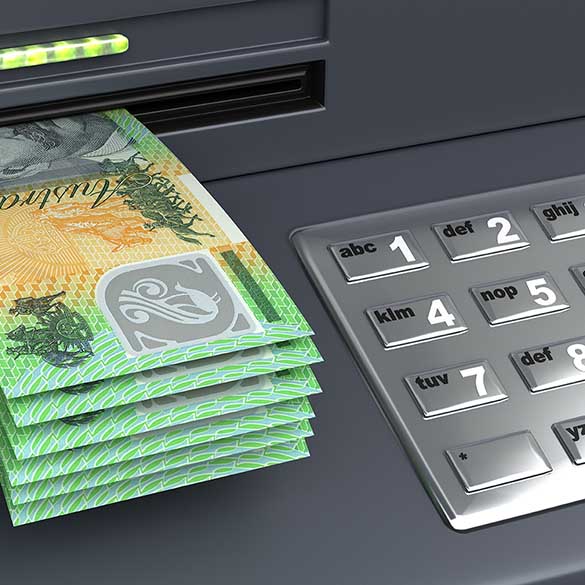Australian Currency
The Australian Dollar is the official currency in Australia and is divided into 100 cents. Coins are issued in denominations of 5c, 10c, 20c, 50c, $1 and $2. Bank notes are issued in bills of $5, $10, $20, $50 and $100.
The bank notes are brightly coloured and made from a polypropylene polymer, they each have a transparent section through the centre to prevent fraud.
Both cash and credit/debit cards are accepted in most places in Australia.
Banking
The four major Australian banks with branch networks are:
Foreign banks operating in Australia include:
- Bank of America
- HSBC Bank
- Bank Nationale de Paris
- Barclays Bank of Australia
- Bank of Tokyo Australia
- Deutsche Bank of Australia
- Hong Kong Bank of Australia
Opening a Bank Account
In order to open a bank account in Australia, government legislation requires that satisfactory identification is needed and this is known as the “100 point check”. This involves the presentation of more than one certificate such as a passport, driver’s licence, birth certificate and credit cards. The following are some forms of identification and their point values:
- Current passport (if arrived in the last 6 months): 100
- Current driver’s licence: 40
- Name and address confirmed in writing by employer within the last 2 years: 35
- Birth Certificate: 70
- Medicare Card: 25
- Credit Card (one only per institution): 25
Australia Post offers an In-person identity check service.
Some banks can assist in establishing bank accounts prior to arriving in Australia. Depending on the country of origin, links between banks in the home country and Australia may enable the bank to arrange an identity test and subsequently provide a card prior to arriving in Australia. This should facilitate immediate access to funds.
Banking Hours
Monday to Thursday – 9:30 am to 4:00 pm
Friday – 9:30 am to 5:00 pm
Saturday – Some banks are open Saturday mornings. Please check with local branch.
Automatic Teller Machines (ATMs)
Automatic Teller Machines are installed at banks and convenient locations throughout Australia and are accessible 24 hours, 7 days a week.
Electronic Funds Transfer at Point of Sale (EFTPOS)
EFTPOS is used extensively in the purchase of all goods and services and at a variety of outlets. This type of transaction involves the immediate withdrawal (electronic transfer) of funds from the individual’s account. Banks provide customers with a card and PIN (Personal Identification Number) to utilise this service.
EFTPOS Tap & Pay is now available on millions of Australian cards. For everyday purchases under $100, simply tap your card on the eftpos machine where indicated. For everyday purchases above $100, tap then enter your PIN. The advantage of Tap & Pay is speed and simplicity at the checkout. EFTPOS is also available on mobile phone via Apple Pay or Google Pay for cardholders from selected banks and financial institutions.
Cash can be withdrawn in a fast and secure way from checkouts at participating merchants using an EFTPOS card or an EFTPOS enable mobile phone.
Fees and Charges
Banks vary in respect to the fees charged for various accounts. Customers are advised to check these fees with individual banks.
Credit Cards
All major credit cards are widely understood and used throughout Australia.
Important Note – Credit Cards no longer accept a signature for authorisation. Only a PIN is accepted. New clients arriving from overseas may not have a PIN attached to all cards, therefore you will need to have a PIN set before leaving your home country.
The main cards are:
- American Express
- Mastercard
- Visa
- Diners Club

